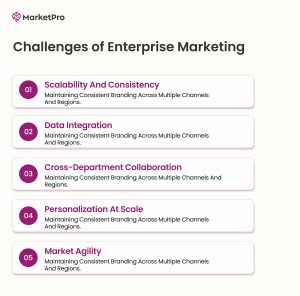- What is Enterprise Marketing: Understanding the Basics
- Features and Benefits of Enterprise Marketing
- Pre Requisites of Designing an Enterprise Marketing Strategy
- How to Create an Enterprise Marketing Strategy?
- Why is Enterprise Marketing Complex?
- Enterprise Marketing Tips
- Adopt Enterprise Marketing Strategies That Make You Stand Out with Market Pro
In the fast-paced world of enterprise marketing, standing out isn’t just about keeping up. It is about leading the charge.
Imagine a landscape where your brand doesn’t just participate but shapes the conversation. It drives innovation and sets the benchmarks that others strive to meet. Enterprise marketing isn’t just a strategy. It is a powerful narrative that places your brand at the forefront of industry change and ensures the company’s growth.
Enterprise-level businesses employ more than a thousand people and earn around one billion dollars every year. They use data insights and advanced technology to increase their brand authority within the business world. But that’s not all.
In this blog, we discuss the core features of enterprise marketing, enterprise SEO, and enterprise content marketing solutions.
What is Enterprise Marketing: Understanding the Basics
Enterprise marketing is done by large-scale organizations that have complex needs. It is different from traditional marketing, which targets small businesses and individual consumers. The former caters to the demands of large-scale and multi-national companies. It usually targets industry leaders.
Enterprise marketing is essential as the average website has a bounce rate of 37%. Enterprises need an integrated marketing strategy because they have to operate across multiple regions. Additionally, they must incorporate diverse product lines and a wide range of consumers. A one-shoe-fits strategy will not work for them.
Features and Benefits of Enterprise Marketing

Pre Requisites of Designing an Enterprise Marketing Strategy
Before you design an enterprise marketing strategy, it is important to follow a couple of prerequisites. Once the company identifies its objectives, it can evaluate the channels on which it can reach the right audience. Here are a couple of prerequisites for designing the best enterprise marketing strategy.
- Step 1: Defining your end goals and audience: The first step is to identify your end goal and your key performance indicators. Next, think of which audience you want to reach.
- Step 2: Identify the marketing channels: Next, identify the marketing channels you want to use. You can assess advertising trends to pick out the best platforms for paid advertising.
- Step 3: Finalizing your Brand Messaging: The next step is to think of a brand message that you will promote across all channels. Whether you are using narrative building or storytelling, make sure your brand messaging is unique and engaging.
How to Create an Enterprise Marketing Strategy?
Enterprises use a variety of marketing strategies to upscale their brands. However, there are certain things that are consistent across all large-scale companies and corporations. Here is how you can create an excellent strategy for your enterprise.
1. Make your Inbound Marketing more Personalized
Personalization is key to achieving the right results. Having personalized marketing strategies is the best way to target individuals who are lower down the sales funnel. 89% of marketers say that they receive a positive ROI when they make personalized campaigns.
Personalizing inbound marketing techniques can help companies increase their engagement and repeat customers. Additionally, using programmatic advertising can further increase brand reach and attract more customers to your enterprise.
2. Prioritize Lead Generation of your Company
Anyone interested in effective enterprise marketing should also prioritize lead generation and lead scoring. This is the process of ranking your customers who are in the target market and hoping that they will eventually convert into consumers. Enterprise SEO using data analysis may help companies identify these high-ranking customers.
Earlier, either the sales teams or the marketing teams used to manage lead scoring. Today, this has changed, and most enterprises use automated software to create lead scores. This helps marketing and sales teams stay focused on their own objectives.
3. Build Brand Awareness for Better Reach
Brand awareness and consistent b2b branding is another important component of enterprise marketing. By doing this, companies can ensure that their brands send a consistent message across the board.
Building brand awareness often helps enterprise companies gain more customers by determining how the company can attract both current and prospective clients. Some companies do this by engaging consistently with people on social media and creating relatable content.
When they post new content, they can analyze the response to it to know what works best with their potential customers.
4. Focus on Word-of-Mouth Marketing and User-Generated Content
Many people trust word of mouth more than they trust reviews and recommendations of random people. Companies are hence spending a lot of time ensuring that they get micro influencers on board to increase user-generated content.
Moreover, UGC content works because consumers are more likely to be attracted to photo and video reviews. They trust other humans who have used the product much more than company reviews. Social media ad campaigns also typically reach wider audiences.
Why is Enterprise Marketing Complex?
Enterprise marketing is not simple. An excellent enterprise digital marketing agency is usually required to handle the complex nature of enterprise SEO and enterprise content marketing. Here are some challenges you will face when doing marketing for a large-scale corporation.

- The complexity of managing multiple campaigns: Enterprises need to handle multiple large-scale campaigns to ensure consistent branding. This is challenging and overwhelming and requires strategic planning. Companies like IBM might struggle to market their products across various markets across the globe.
- Data Integration and Management: Large-scale corporations gather and access vast amounts of data. Companies like Walmart will find it difficult to merge customer data from their in-store and online platforms. A good marketing strategy would be to integrate all this data from various sources and utilize it effectively.
- Adapting to Rapid Market Changes: The dynamic nature of markets can make it difficult for enterprises to adapt their marketing strategies quickly. For instance, a global fast-food chain like McDonald’s may struggle to pivot its marketing campaigns quickly in response to sudden shifts in consumer preferences or economic conditions.
Enterprise Marketing Tips
Some additional tips that enterprises can use to improve their marketing efforts include:
- Develop targeted content that will address the pain points of your customers.
- Invest in and develop high-quality thought leadership to ensure your brand is positioned at the top.
- Use account-based marketing to ensure you attract the best B2B brands.
- Improve the alignment and collaboration between sales and marketing teams so they can develop cohesive strategies.
- Implement automation tools to streamline processes and improve campaign efficiency.
Adopt Enterprise Marketing Strategies That Make You Stand Out with Market Pro
Enterprises that generate millions and billions of revenue can not compromise on their branding or their messaging. They want to ensure an effective online reputation management team that keeps them ahead in the game.
A good digital enterprise marketing agency will ensure the best enterprise SEO and enterprise content marketing to facilitate the growth and expansion of your enterprise. Market Pro offers individualized corporate marketing services that help you achieve a lasting impression on your consumers. With our expert SEO, PPC, and content managers, you can rest assured that your business will grow exponentially.
Do not accept mediocrity because it is ‘one size fits all’- let us help you differentiate yourself from competitors and be a leader in your industry.

